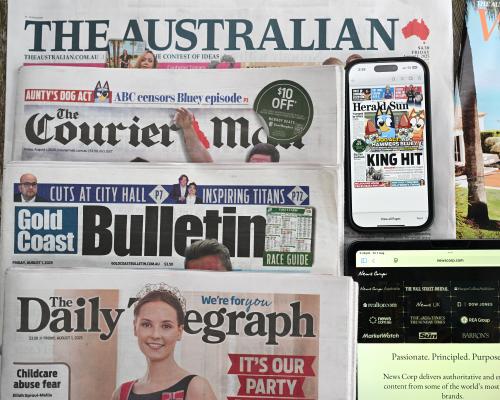
Revenue generated from News Corp’s global newspaper mastheads has fallen sharply, including in Australia, weighing down an otherwise positive financial result.
Rupert Murdoch’s media conglomerate continues to generate large wads of cash from its digital real estate arm but advertising revenue at News Corp Australia, a division that includes the Australian, the Daily Telegraph and the Herald Sun, was down 5% over the past financial year to US$343m (A$530m).
Circulation and subscription revenue also fell, according to results released early on Wednesday.
-
Sign up to get Guardian Australia’s weekly media diary as a free newsletter
Its UK news division, which counts the Times and the Sun among its mastheads, suffered even steeper revenue falls, as weak advertising conditions buffeted media companies around the world.
News Corp, a US-headquartered company that is also listed on the ASX, owns mastheads in the US, the UK and Australia, and operates the book publisher HarperCollins.
The Murdoch-controlled company also owns the Wall Street Journal publisher Dow Jones and has a majority stake in REA Group, the owner of realestate.com.au.
It announced the sale of Foxtel late last year.
While News Corp is best known for its traditional media assets, it describes the book publishing, real estate portal and Dow Jones information businesses as its “core growth pillars”.
The latter two divisions generated record income last year, lifting overall revenue to US$8.45bn (A$13.1bn), up 2%.
Its controlling stake in REA has generated an ongoing windfall for News Corp, given that the division is tapped directly into Australia’s robust property market.
The real estate portal is expected to soon face stiffer competition from its rival Domain, which has just been sold to the US giant CoStar.
The News Corp chief executive, Robert Thomson, described the overall result as “sterling”.
Thomson told analysts shortly after the financials were released that News Corp was in “in the midst of advanced negotiations with several AI companies” over the purchase of its intellectual property.
Media companies around the world have raised concerns over how they will be compensated for content already being used to train AI products.
In comments designed to attract the attention of the US president, Thomson referred to books including Donald Trump’s The Art of the Deal being used by AI engines without compensation.
“Is it right that his books should be consumed by an AI engine which then profits from his thoughts by cannibalising his concepts, thus undermining future sales of his book?” Thomson said.
“Suddenly, The Art of the Deal has become the art of the steal.
“We will fight to protect the intellectual property of our authors and journalists and continue to woo and to sue companies that violate the most basic property rights.”





